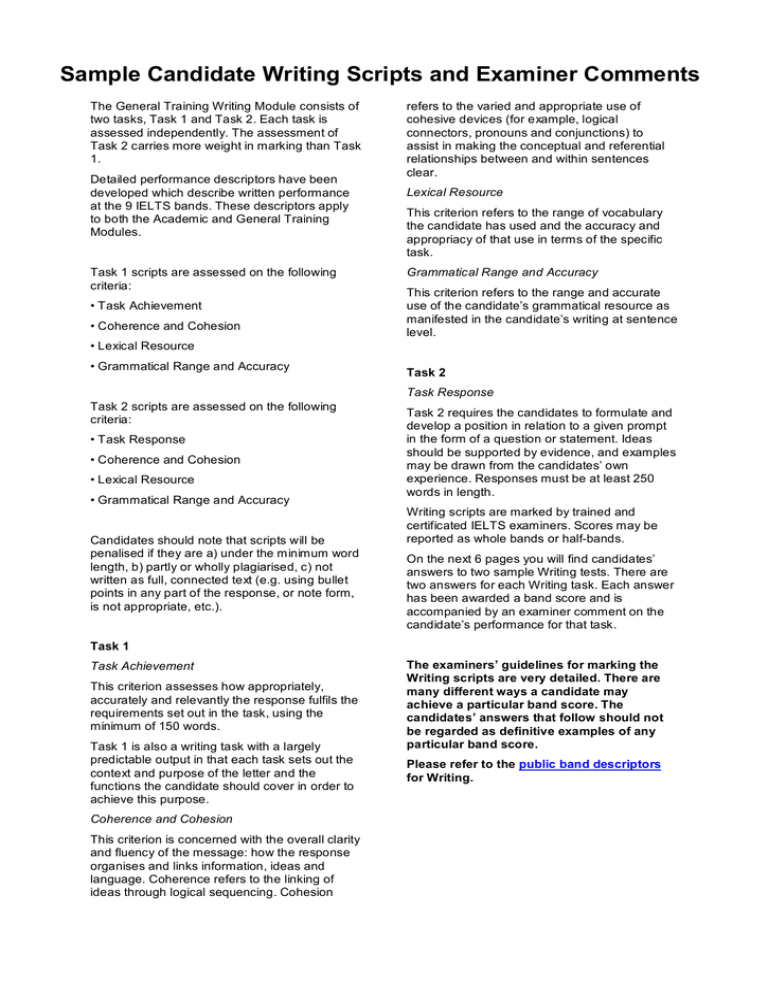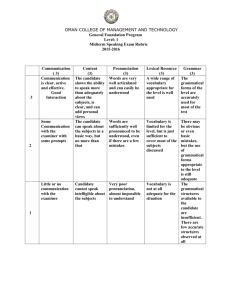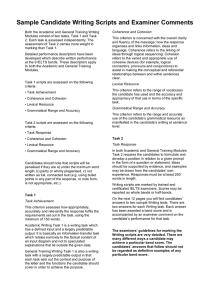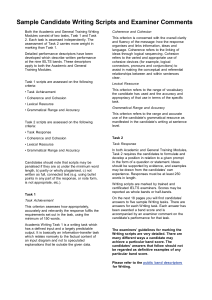Sample Candidate Writing Scripts and Examiner Comments
advertisement

Sample Candidate Writing Scripts and Examiner Comments The General Training Writing Module consists of two tasks, Task 1 and Task 2. Each task is assessed independently. The assessment of Task 2 carries more weight in marking than Task 1. Detailed performance descriptors have been developed which describe written performance at the 9 IELTS bands. These descriptors apply to both the Academic and General Training Modules. Task 1 scripts are assessed on the following criteria: • Task Achievement • Coherence and Cohesion refers to the varied and appropriate use of cohesive devices (for example, logical connectors, pronouns and conjunctions) to assist in making the conceptual and referential relationships between and within sentences clear. Lexical Resource This criterion refers to the range of vocabulary the candidate has used and the accuracy and appropriacy of that use in terms of the specific task. Grammatical Range and Accuracy This criterion refers to the range and accurate use of the candidate’s grammatical resource as manifested in the candidate’s writing at sentence level. • Lexical Resource • Grammatical Range and Accuracy Task 2 Task Response Task 2 scripts are assessed on the following criteria: • Task Response • Coherence and Cohesion • Lexical Resource • Grammatical Range and Accuracy Candidates should note that scripts will be penalised if they are a) under the minimum word length, b) partly or wholly plagiarised, c) not written as full, connected text (e.g. using bullet points in any part of the response, or note form, is not appropriate, etc.). Task 2 requires the candidates to formulate and develop a position in relation to a given prompt in the form of a question or statement. Ideas should be supported by evidence, and examples may be drawn from the candidates’ own experience. Responses must be at least 250 words in length. Writing scripts are marked by trained and certificated IELTS examiners. Scores may be reported as whole bands or half­bands. On the next 6 pages you will find candidates’ answers to two sample Writing tests. There are two answers for each Writing task. Each answer has been awarded a band score and is accompanied by an examiner comment on the candidate’s performance for that task. Task 1 Task Achievement This criterion assesses how appropriately, accurately and relevantly the response fulfils the requirements set out in the task, using the minimum of 150 words. Task 1 is also a writing task with a largely predictable output in that each task sets out the context and purpose of the letter and the functions the candidate should cover in order to achieve this purpose. Coherence and Cohesion This criterion is concerned with the overall clarity and fluency of the message: how the response organises and links information, ideas and language. Coherence refers to the linking of ideas through logical sequencing. Cohesion The examiners’ guidelines for marking the Writing scripts are very detailed. There are many different ways a candidate may achieve a particular band score. The candidates’ answers that follow should not be regarded as definitive examples of any particular band score. Please refer to the public band descriptors for Writing. General Training Writing Sample Task 1 Sample Script A Examiner comment Band 5 The answer is below the word limit and there is some repetition of the task rubric. (Length is a common problem in General Training scripts.) Answers that are short lose marks because of inadequate content and may also lose marks because there is insufficient material in the answer for the examiner to give credit for accuracy and coherence. Despite these problems, the introduction to the letter is appropriate and the purpose of the writer is clear. The points are not always linked together well and punctuation is sometimes faulty. The sentences are kept quite simple and mistakes occur as soon as more complex structures are attempted. General Training Writing Sample Task 1 Sample Script B Examiner comment Band 7 This answer is also short. Although ideas are often provided in the task rubric, candidates are at liberty to include some of their own ideas in their answers. In this case, the candidate has attempted to incorporate some original material. The answer reads quite fluently, is well organised and there is good use of conjunctions to link points. There are some grammatical errors but these do not affect the reader greatly and there is evidence of some more complex sentence structures. General Training Writing Sample Task 2 Sample Script A Examiner comment Band 5 There are quite a lot of relevant ideas in the answer but they are not always well supported and sometimes they are unclear. There are some areas in the answer where the organisation becomes weak and the reader finds the message difficult to follow. Nevertheless, the writer’s view is apparent and there is a logical flow to the points given. There are a lot of mistakes in the answer and some parts, such as the conclusion, are very hard to follow because of these errors. Although there is some appropriate vocabulary, sentence control is very weak. These problems are made worse by the poor correcting which sometimes makes words unreadable. General Training Writing Sample Task 2 Sample Script B Examiner comment Band 8 This is a very well­organised script which contains a lot of well­supported arguments and analyses the topic from different angles. The ideas follow each other well and there is a very honest conclusion. The answer is easy to read. There are some areas where the expression is clumsy but this makes little difference to the overall flow of the answer. There are minor errors in spelling and structure.


